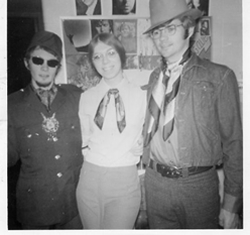Waterloo was a small but exciting institution when Nancy Silcox (BA 1971, B. of Ed. 1972 (Western), MA 1976) was a student, a place with its share of the campus revolts and political protests in 1960's North America. The Chevron, the school newspaper, was full of protest news from around the world, and students protested the Vietnam War and other global events, as well as campus issues. "They seem innocuous today, issues such as the library shortening their hours, the book stacks being off limits for a period of time, and the professors getting longer book loan periods. But in those days, everything that "the system" did to you was a big deal. Hence a big noisy sit in," Nancy recalls.
 She says that it's "worth being 60 years of age to have gone through those days at Waterloo because they were alive and vibrant... Those were the best years of my life, truly."
She says that it's "worth being 60 years of age to have gone through those days at Waterloo because they were alive and vibrant... Those were the best years of my life, truly."
Class sizes were small when Nancy was a student. Her largest class consisted of no more than 30 people, and the average class size was only 20 students. With the small classes, she found that she came to know her classmates and professors well. The professors would invite students to their homes for barbeques and other social events. She has warm personal memories of those great years. "I am very happy I was able to partake in them."
Fond memories of English classes take the form of favorite professors rather than favourite course content. Gordon Slethaug's courses Forms of Fantasy and American Literature come to mind. Nancy also has strong positive memories of Dr. Roman Dubinski teaching a course on Major Poets of the 17th Century, such as John Donne and George Herbert. Both Dr. Slethaug and Dr. Dubinski became role models and inspired her to pursue literary studies at the graduate level. Somehow, she never took a course in Old English, and she never studied Chaucer. However, she does not see this as a hole in her learning because she sampled widely in so many other areas.
Becoming an English high school teacher was Nancy's life-long dream. After graduation, Nancy attended Althouse Faculty of Education at the University of Western Ontario, but before taking a teaching position, she decided to return to UW to upgrade to an Honours degree. Once back at UW, she decided to stay on and complete a Master’s Degree. "This was so much easier then than now, because you did not need to have straight A's to get into graduate school--which I did not." She confesses to "goofing off occasionally" in undergraduate courses but she needed to pull up her socks to complete a make-up fourth year, which would allow her into Master’s studies. Nancy went on to earn her Master's Degree from UW in 1976. Retrospectively she looks back on her "second chance." "Going to university is a privilege, and you never want to spoil that privilege. Luckily I did get that second chance." She goes on to say that, she feels that then, as now "a university degree is a gift and it is very, very important... I'm not entirely sure I appreciated at the time how important it was to have a university degree."
Upon completing the Master's degree, Nancy returned to teaching high school. She taught full-time in the secondary school system of Waterloo Region until 2000, when she began to work in the Office of Persons with Disabilities at UW. She finished her career at the Disability Services Office at Wilfrid Laurier University, counselling students with Learning Disabilities and Attention Deficit Disorder. Today she enjoys a successful third career as a full-time freelance writer writing for The Record, Grand and Most Magazines, and is working on her fourth published book. She calls herself fortunate in this occupation too: "I am a full-time journalist and I actually earn a living in my craft. How many people who call themselves writers can say that?"